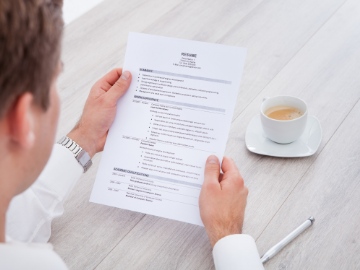What Is the Purpose of a Cover Letter? Essential Career Advice

When applying for a job, many candidates wonder, "What is the purpose of a cover letter?" While your resume provides a summary of your past experience and skills, a compelling cover letter does much more-it introduces you personally, highlights your relevant skills, and explains why you're the best fit for the open position.
A well-written cover letter can set you apart from other candidates, showing the hiring manager your genuine interest in the role and the company's values. Unlike a resume, which lists facts, a cover letter allows you to tell a story-one that aligns your career goals with the job requirements.
In this guide, we'll break down the key elements of a standout cover letter, how to tailor it to the job description closely, and why it's a crucial part of the application process.
What is a cover letter?
A cover letter is a one-page document that accompanies your resume when applying for a job. While your resume outlines your work history, education, and relevant projects, the cover letter content adds context. It explains why you're interested in the position and how your soft skills and specific examples of past success make you the best choice.
Most recruiters and hiring managers expect a letter, even if it's not explicitly required. Submitting one shows initiative and helps you:
- Address the hiring manager directly (avoiding a generic greeting like "Dear Sir").
- Tailor your application to the job description closely.
- Provide constructive feedback on how you can contribute to the company.
Why a cover letter matters in the job market
Most recruiters and hiring managers receive dozens (sometimes hundreds) of applications for a single job listing. A strong letter helps you:
- Stand out from other applicants- A personalized letter shows effort and enthusiasm.
- Demonstrate strong writing skills- Employers value good communication skills, which are evident in your writing.
- Highlight relevant experience- You can expand on specific examples from your past experience that match the job requirements.
- Showcase soft skills- Unlike a resume, a cover letter lets you emphasize organizational skills, teamwork, and problem-solving.
- Express genuine interest- By researching the company mission, you can explain why you want to work there.
Without a cover letter, you risk blending in with other candidates who submit only a resume. A well-crafted letter ensures the hiring manager's name (or at least a "Dear Hiring Manager" if unknown) sees you as a strong candidate.
Key elements of a strong cover letter
To write a compelling cover letter, you must include these key elements:
1. Proper formatting & structure
Your letter should be concise-one page maximum-and use a professional font like New Roman. A well-structured cover letter draft includes:
- Opening paragraph- Grab attention by mentioning the job title and expressing enthusiasm.
- Body paragraphs- Highlight relevant experience and specific examples of your achievements.
- Closing paragraph- Express gratitude, reiterate interest, and suggest a follow up.
2. Personalized greeting
Avoid a generic greeting like "Dear Sir" or "Dear Hiring Manager". If possible, address the hiring manager's name directly. Research the company website or LinkedIn to find the specific person responsible for hiring.
3. Tailored content matching the job description
A standout cover letter doesn't just list skills-it connects them to the job requirements. Study the job listing and mention:
- Specific skills that match the role (e.g., organizational skills, customer experience expertise).
- Relevant projects from your past experience that prove your qualifications.
- How your career goals align with the company mission.
4. Showcase soft skills & writing skills
Most recruiters look for soft skills like teamwork, adaptability, and problem-solving. Use your letter content to demonstrate these traits through specific examples. Strong writing skills also signal professionalism and attention to detail.
5. Express genuine interest in the company
Employers want candidates who are passionate about the company name. Mention specific aspects of the business that excite you, such as their innovations, culture, or impact in the industry. This proves you're not just applying randomly but targeting your dream job.
Cover letter template
To help you write a cover letter, here's a basic structure:
[Your Name]
[Your Address]
[Your Email]
[Your Phone Number
[Date]
[Hiring Manager's Name]
[Company Name]
[Company Address]
Dear [Hiring Manager's Name],
[Opening Paragraph]
State the job title you're applying for and where you found the listing. Express enthusiasm and briefly mention why you're interested.
[Body Paragraphs]
- Discuss specific skills and relevant experience that match the job description.
- Provide specific examples of past achievements (e.g., improved customer experience, led relevant projects).
- Show how your career goals align with the company mission.
[Closing Paragraph]
Thank the reader for their time, express interest in discussing further, and mention a follow-up.
Sincerely,
[Your Name]
Cover letter example
Here's an example of a standout cover letter for a Marketing Manager position:
Jane Doe
123 Main Street
janedoe@email.com
(555) 123-4567
August 15, 2025
Mr. John Smith
ABC Marketing Solutions
456 Business Ave.
Dear Mr. Smith,
I am excited to apply for the Marketing Manager position at ABC Marketing Solutions, as advertised on LinkedIn. With over five years of experience in digital marketing and a passion for data-driven strategies, I am eager to contribute to your team's success.
In my current role at XYZ Agency, I increased client engagement by 40% through targeted social media campaigns. My expertise in SEO and content marketing aligns with ABC's focus on innovative solutions. Additionally, I led a team that improved organizational skills and streamlined project workflows, resulting in a 25% boost in productivity.
ABC's commitment to creativity and growth resonates with my career goals. I would welcome the opportunity to discuss how my skills can support your upcoming campaigns. Thank you for your time-I look forward to your response.
Sincerely,
Jane Doe
How a cover letter enhances your job application
A cover letter enhances your job application by personalizing your skills and connecting them to the employer's needs.
1. It introduces you beyond the resume
While a resume lists qualifications, a cover letter introduces your personality and motivations. It answers:
- Why do you want this position?
- How does your past experience make you a great fit?
- What unique value can you bring?
2. It demonstrates effort & research
A generic letter won't impress potential employers. But tailoring your letter content to the job description closely shows you've done your homework. Mentioning the company's values or recent achievements proves you're invested.
3. It highlights what makes you different
In a competitive job market, standing out is crucial. Your letter can emphasize:
- Unique relevant experience that other candidates may lack.
- Specific skills that directly address the employer's needs.
- A compelling story about why this role matters to you.
4. It encourages engagement & follow-up
A strong closing paragraph invites the hiring manager to continue the conversation. Phrases like:
- "I'd welcome the opportunity to discuss how my skills align with your needs."
- "I look forward to the possibility of contributing to your team."
...show initiative and keep your next job application memorable.
Common mistakes to avoid in a cover letter
When you write a cover letter, steer clear of these pitfalls:
- Repeating your resume - Instead of listing the same information, expand on key achievements in more detail.
- Using a generic template - A one-size-fits-all approach won't resonate with potential employers.
- Being too formal or impersonal - A robotic tone won't engage the reader. Keep it professional yet conversational.
- Ignoring the job description - Failing to address the job requirements makes you seem disinterested.
- Making it too long - Stick to one page-most recruiters won't read beyond that.
Final tips for writing an effective cover letter
Here are some final tips to make your letter polished, professional, and impactful.
- Use the second paragraph to connect your relevant skills to the job description.
- Express gratitude for the opportunity to apply.
- Request constructive feedback if you don't get the role-it helps improve future applications.
- Proofread carefully-errors can undermine your strong writing skills.


